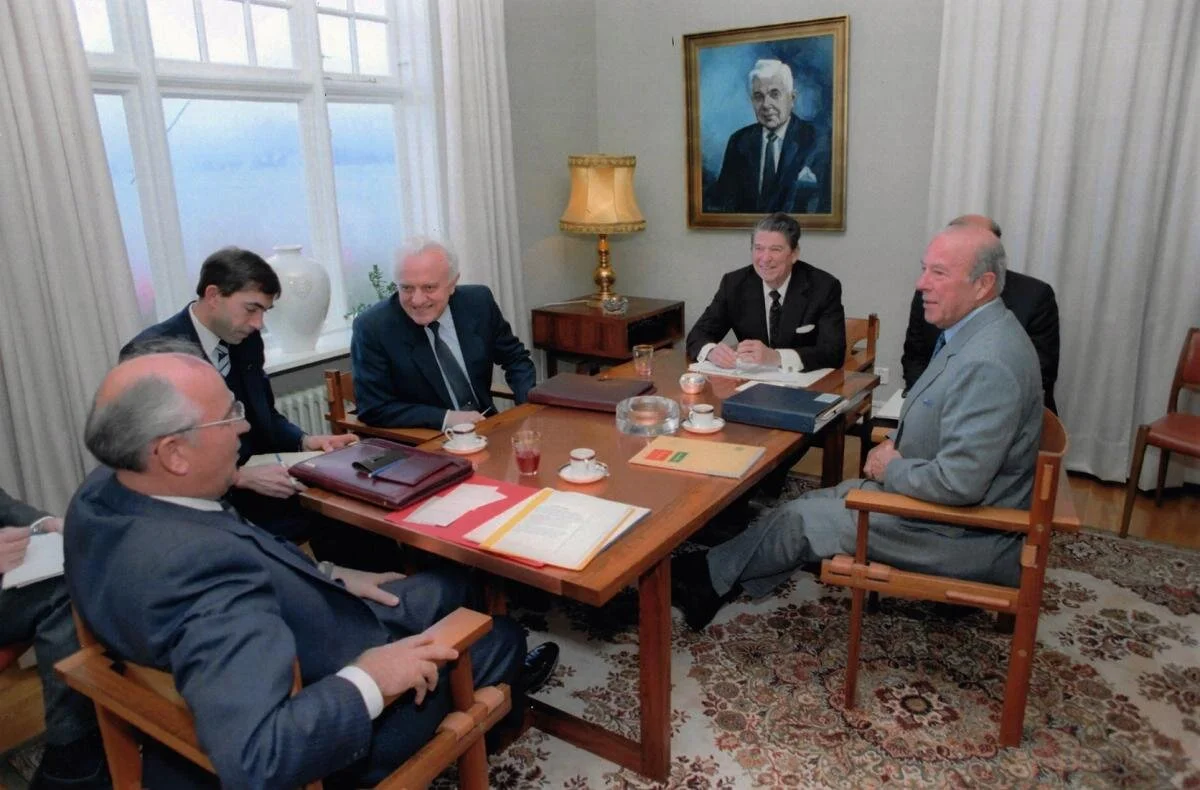
Disarmament Times - March 2021
Disarmament Negotiations:
Shultz and Gorbachev — Biden and Putin
By: John Washburn
At a working session at Hofdi House during the Reykjavík Summit, October 1986. From left: General Secretary of the Central Committee of the Communist Party of the Soviet Union Mikhail Gorbachev, an interpreter, USSR Foreign Minister Eduard Shevardnadze, U.S. President Ronald Reagan, U.S. Secretary of State George Shultz.
Courtesy of the Ronald Reagan Presidential Library
Almost until his death on February 6, George Shultz pursued disarmament with Russia both as Reagan’s secretary of state and in his active public life thereafter. Now the similarities and differences between his disarmament accomplishments and the challenges for the Biden administration in its negotiations for arms control with Russia provide an important perspective for assessing and managing those challenges.
The path to the signature of the Intermediate Nuclear Force treaty (INF) by Reagan and Gorbachev on December 8, 1987 extended over 3 years and at many levels of negotiation between the two countries. Both men believed that the total abolition o nuclear weapons had to be the ultimate goal, but that it had to be accompanied by missile defenses. The breakthrough to signature came when Gorbachev abandoned his opposition to those defenses.
It appears that in the current negotiations both sides agree that eventually there must be total abolition of nuclear weapons. Putin said so on October 24, 2018. An abolition treaty has been negotiated at the United Nations and come into force, but no nuclear weapons state including the United States has ratified it.
There are several stark differences between 1987 and now. Putin is not like Gorbachev and leads a much more powerful and assertive Russia. He sees his country’s headlong increase in the numbers and sophistication of its nuclear weapons as essential to Russia’s security, freedom of international action and prestige. His suspicion of the United States is intense and embittered.
Courtesy of CNN
On the American side, it is not yet clear whether Biden wants or feels able to engage in nuclear disarmament with the intensity and expenditure of time that Reagan did. Much of his personal attitude toward nuclear disarmament is not yet clear totally and in detail.
At the same time, it is clear that Putin has clearly defined but important interest in some kinds od nuclear arms control. The START treaty has been extended. Negotiations continue on a new INF treaty. He has declared that Russia will remain in the Open Skies treaty if the US rejoins it. These openings need to expanded and pursued to next steps and more mutual understanding.
As a person with a long history of very senior positions in government, Shultz understood the importance to nuclear disarmament of the academic and non-governmental organizations where he served after leaving the administration, but also the great value of engaging the establishment. To the latter end he convened former senator Sam Nunn, former Defense secretary William Perry and Henry Kissinger into a permanent support and advocacy team. A similar group of retired grandees could do much to help an overloaded Biden administration with a polarized country and a suspicious Russia as it negotiates nuclear disarmament.

